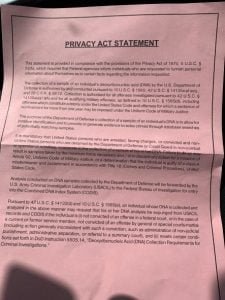How to Expunge DNA Records
DNA Records associated with a sexual assault investigation
Having DNA taken is part of the investigatory process for those caught up in a sexual assault investigation. It is a legal invasion of privacy made worse by knowing your DNA remains in a criminal database even after being cleared of suspicion. But military members, veterans, and civilians have the right to have their DNA expunged from the Combined DNA Index System, or CODIS, if they have no convictions. Administrative punishment doesn’t count as a conviction for this purpose. This article explains how to go about getting your DNA expunged from CODIS.
Expunge DNA records from CODIS
Service members still on active duty can request in writing through their chain of command to for their DNA records to be expunged. Service members will forward requests for expungement through the first commanding officer in the grade of major or lieutenant commander or higher in the service member’s chain of command. They should include adequate proof that the charges associated with the sexual assault investigation have been dismissed, withdrawn, or disposed in a way that didn’t result in a preferral of charges or otherwise have not and will not result in a conviction of any offense. This also includes proof produced by a general or special court-martial convening authority that has the effect of a full acquittal. The service member can acquire this proof through a FOIA request through the FOIA agency of their service. Many subordinate commands within the military service have their own FOIA offices so getting as close to the source of the information may speed the process along. Otherwise, requestors can start at the DoD Level.
The service members first commanding officer in the grade of major or lieutenant commander or higher will review and confirm the information. After consultation with the appropriate legal advisor, the chain of command will forward request through the relevant DoD Law Enforcement Agency. The DOD LEA will then validate that the Service member has no convictions that would prohibit expungement, either associated or not associated with a sexual assault investigation. The DoD LEA will send appropriate requests for expungement to the Army Criminal Investigation Laboratory (USACIL). USACIL is the DoD’s major crime lab. The DCIOs, other DoD LEAs, and CGIS shall maintain a copy of all requests in the investigative case file, including those requests not forwarded to USACIL because expungement was not authorized. USACIL will review requests for expungement to ensure they contain all of the required information. Incomplete requests will be returned to the submitter. When a request for expungement is received, and that request is complete and complies with the criteria in Paragraph 4.5 of DOD INSTRUCTION 5505.14., USACIL will expunge the DNA records, destroy the submitted sample.
What qualifies Current Service Members to request expungement?
Current service members from whom DNA samples were taken but who were not convicted at general or special court-martial may request in writing that their DNA records be expunged. Conviction at court-martial does not include non-judicial punishment, administrative separation, or referral to a summary court-martial. For example, if a service member has DNA taken for an offense that ultimately results in punishment under Article 15 (non-judicial punishment) or in administrative separation (chapter board), those adverse actions are not considered a “conviction” and the service member may request expungement of their DNA records. Expungement requests must include proof that the charges were dismissed, withdrawn, never preferred, or otherwise have not and will not result in a criminal conviction. This service member’s request will be reviewed by their commanding officer and then submitted to the relevant DoD law enforcement organization to validate that there is no conviction from a sexual assault investigation that would prohibit expungement. Once confirmed, the DoD law enforcement organization will send a request for expungement to USACIL. When a request for expungement is properly submitted, USACIL will expunge the DNA records, destroy the submitted sample, notify the service member of its actions, and maintain documentation of that notice.
How do Former Service Members request DNA record expungement?
Former or retired Service members will submit requests for expungement to the Clerk of Court of the Military Department’s Court of Criminal Appeals. Specific information on the qualifications for expungement and the formatting of the request are available on pg. 10 of DOD INSTRUCTION 5505.14. Requests that do not provide adequate information to identify the alleged offense or to confirm that the alleged offense did not result in a conviction will be returned by “return receipt requested” with an explanation of the deficiency. The requestor should attempt to obtain this proof of non-conviction through a FOIA request through their former military service’s FOIA agency.
How do civilians request DNA record expungement?
When there is probable cause to believe civilian has committed a qualifying federal offense, those detained by military law enforcement may have their DNA samples taken. Like service members, those DNA samples obtained by law enforcement are forwarded to USACIL. Civilians may request in writing that their DNA sample be expunged if they were not convicted, or their conviction was overturned. If the civilian has a separate conviction, their request for DNA record expungement will be denied even if the DNA sample was not related to this conviction. To request expungement of DNA records the requestor or legal representative must submit a written request to: USACIL ATTN: CODIS Branch 4930 N. 31st Street Forest Park, GA 30297. There are specific requirements for adequate proof to accompany this request. Civilians should reference pg. 11 of DOD INSTRUCTION 5505.14 to find out more.






